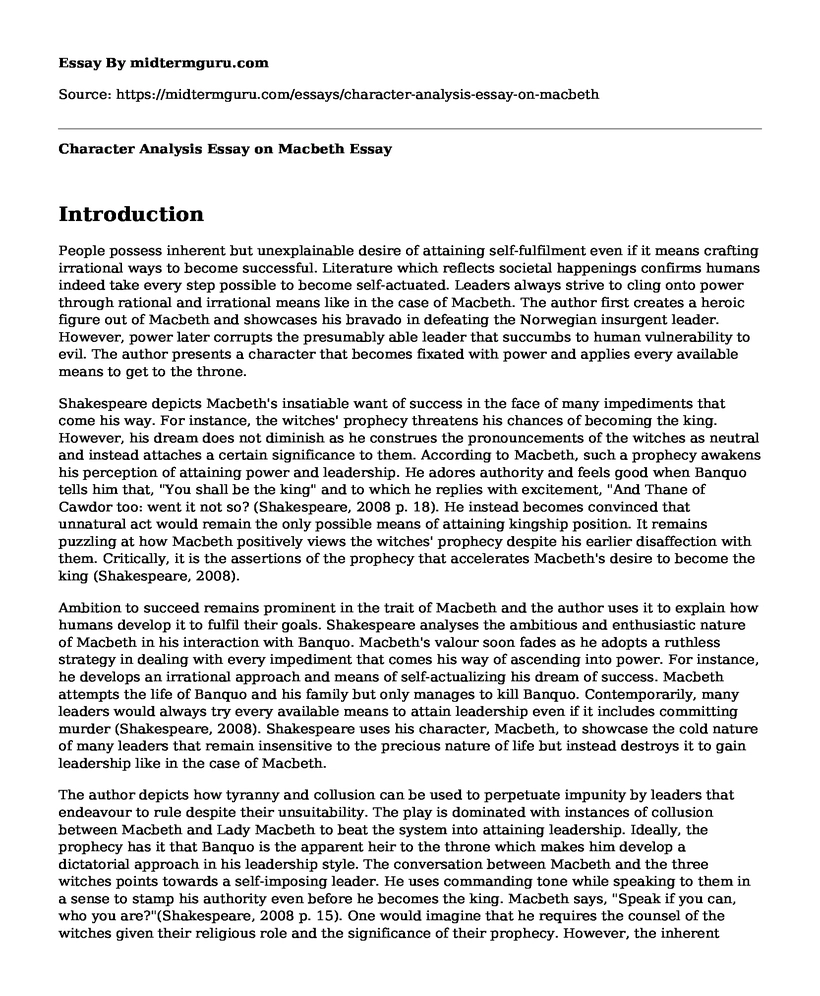Introduction
People possess inherent but unexplainable desire of attaining self-fulfilment even if it means crafting irrational ways to become successful. Literature which reflects societal happenings confirms humans indeed take every step possible to become self-actuated. Leaders always strive to cling onto power through rational and irrational means like in the case of Macbeth. The author first creates a heroic figure out of Macbeth and showcases his bravado in defeating the Norwegian insurgent leader. However, power later corrupts the presumably able leader that succumbs to human vulnerability to evil. The author presents a character that becomes fixated with power and applies every available means to get to the throne.
Shakespeare depicts Macbeth's insatiable want of success in the face of many impediments that come his way. For instance, the witches' prophecy threatens his chances of becoming the king. However, his dream does not diminish as he construes the pronouncements of the witches as neutral and instead attaches a certain significance to them. According to Macbeth, such a prophecy awakens his perception of attaining power and leadership. He adores authority and feels good when Banquo tells him that, "You shall be the king" and to which he replies with excitement, "And Thane of Cawdor too: went it not so? (Shakespeare, 2008 p. 18). He instead becomes convinced that unnatural act would remain the only possible means of attaining kingship position. It remains puzzling at how Macbeth positively views the witches' prophecy despite his earlier disaffection with them. Critically, it is the assertions of the prophecy that accelerates Macbeth's desire to become the king (Shakespeare, 2008).
Ambition to succeed remains prominent in the trait of Macbeth and the author uses it to explain how humans develop it to fulfil their goals. Shakespeare analyses the ambitious and enthusiastic nature of Macbeth in his interaction with Banquo. Macbeth's valour soon fades as he adopts a ruthless strategy in dealing with every impediment that comes his way of ascending into power. For instance, he develops an irrational approach and means of self-actualizing his dream of success. Macbeth attempts the life of Banquo and his family but only manages to kill Banquo. Contemporarily, many leaders would always try every available means to attain leadership even if it includes committing murder (Shakespeare, 2008). Shakespeare uses his character, Macbeth, to showcase the cold nature of many leaders that remain insensitive to the precious nature of life but instead destroys it to gain leadership like in the case of Macbeth.
The author depicts how tyranny and collusion can be used to perpetuate impunity by leaders that endeavour to rule despite their unsuitability. The play is dominated with instances of collusion between Macbeth and Lady Macbeth to beat the system into attaining leadership. Ideally, the prophecy has it that Banquo is the apparent heir to the throne which makes him develop a dictatorial approach in his leadership style. The conversation between Macbeth and the three witches points towards a self-imposing leader. He uses commanding tone while speaking to them in a sense to stamp his authority even before he becomes the king. Macbeth says, "Speak if you can, who you are?"(Shakespeare, 2008 p. 15). One would imagine that he requires the counsel of the witches given their religious role and the significance of their prophecy. However, the inherent leadership desire in him makes him authoritative to even the witches in a way depicting how human obsession with power drives them into extremity.
Conclusion
In conclusion, Macbeth mirrors how contemporary leaders rise into power position despite their unsuitability. The author strives to show certain steps that people develop in becoming self-fulfilled despite challenges therein. For instance, Macbeth crafts a sustained power ambition that he achieves with various strategies which include murder of various competitors like Banquo, plot with his wife and impunity.
References
Shakespeare, W. (2008). Macbeth. Waiheke Island: Floating Press.
Cite this page
Character Analysis Essay on Macbeth. (2022, Sep 11). Retrieved from https://midtermguru.com/essays/character-analysis-essay-on-macbeth
If you are the original author of this essay and no longer wish to have it published on the midtermguru.com website, please click below to request its removal:
- Essay on the Feminist Approach in the Yellow Wallpaper by Charlotte Perkins Gilman
- Essay on Animal Farm: Snowball and Napoleon
- Free Soil, Free Labor, Free Men Book Analysis Essay
- Compare and Contrast Essay on Mythological Gods: Hermes and Eshu
- Dreams of Distant Lives: A Symbol of Love and Emotion - Essay Sample
- Who is Responsible For Romeo And Juliets Death? - Essay Sample
- Character Analysis Essay on Odysseus as an Epic Hero







